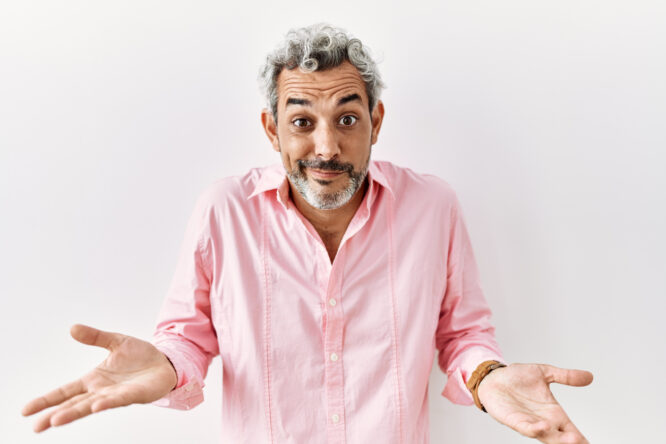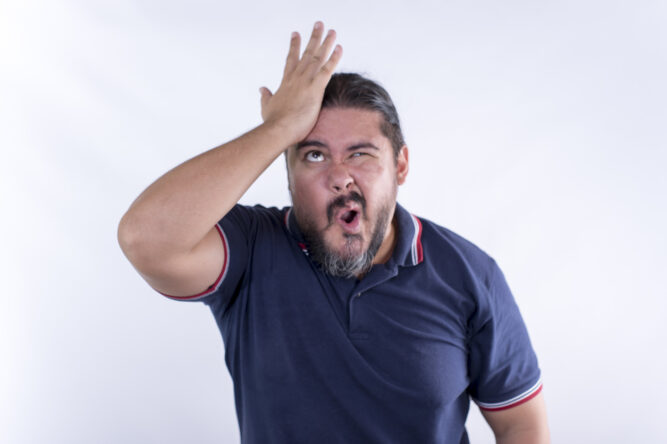You can usually spot someone with low self-awareness not by what they do, but by what they casually say.

These aren’t always rude or cruel comments—they’re often said with total sincerity, which makes them even more telling. It’s the inability to recognise patterns in their own behaviour, how they affect other people, or why certain situations keep repeating. If you keep hearing the same kind of comments from someone who never seems to have a deeper look at themselves, there’s a good chance you’re dealing with someone who’s not quite in tune with how they show up in the world. Here are some of the common things people who lack self-awareness tend to say without even realising what they’re revealing.
1. “That’s just how I am.”

This one often gets tossed out like a full stop in a conversation, as if it ends the discussion and excuses whatever behaviour just took place. It’s a subtle refusal to consider change or growth, all wrapped in a shrug of indifference. People who say this usually aren’t reflecting on whether “how they are” might be hurting those around them. It’s not self-acceptance; it’s defensiveness disguised as confidence—and it often shuts down any chance of real accountability.
2. “Everyone else is just too sensitive.”

When someone brushes off other people’s discomfort by calling them “too sensitive,” it’s usually a sign they’re not willing to consider how their words land. Instead of wondering if they were unkind or careless, they put the blame on everyone else’s reactions. It’s an easy way to avoid looking inward. Of course, sensitivity isn’t the problem—it’s the complete lack of emotional awareness that led to hurting someone in the first place.
3. “I tell it like it is.”

This might sound bold and honest, but more often it’s a cover for saying things without empathy. It usually means someone values bluntness over thoughtfulness, even when it causes harm. There’s nothing wrong with honesty, but self-aware people understand tone, timing, and whether their input was even asked for. Without that filter, “telling it like it is” becomes a licence for rudeness.
4. “People just don’t get me.”

If this is something someone says constantly, it might not be that the world is misunderstanding them—it might be that they’re not very good at seeing how they come across. It’s an easy way to frame themselves as a misunderstood genius instead of someone with rough edges. Self-aware people are curious about how they’re received. They want to understand and adjust, not assume they’re being unfairly judged every time someone reacts badly.
5. “I don’t have time for drama.”

This one usually comes from the person who somehow always ends up in the middle of it. If someone’s constantly talking about how above the drama they are, there’s a chance they’re actually part of the chaos and just don’t realise it. Genuinely drama-free people don’t usually announce it. They just move quietly, resolve issues, and don’t fuel the fire. Loud declarations are often a distraction from what’s really going on.
6. “I’m not the problem, they are.”

When someone refuses to consider that they might have even a small role in a conflict, it’s a clear sign of low self-awareness. Relationships are rarely that black and white. That kind of thinking shows a complete lack of introspection. They’re so focused on being “right” that they never stop to think about how they contributed, or what they could do differently next time.
7. “That’s not what I meant, so you shouldn’t be upset.”

Intentions matter, of course, but so does impact. When someone insists that their good intentions should override how they made someone feel, it shows they’re more concerned with defending themselves than understanding the harm they may have caused. Self-aware people listen when someone says they’ve been hurt. They don’t double down and try to erase the other person’s experience just because they didn’t mean to cause harm.
8. “I can’t deal with negativity.”

This one often shows up as a way to avoid accountability or uncomfortable truths. It’s a way of making someone else’s valid concerns sound like they’re just being negative. It’s not about protecting their peace—it’s about dodging emotional responsibility. True self-awareness means being able to sit with discomfort, not just tuning it out when it doesn’t feel good.
9. “I don’t need therapy—I’m fine.”

Even when they’re clearly stuck in patterns that are hurting themselves or others, some people flat-out reject the idea of getting help. They see it as something only for people who are “broken.” However, therapy doesn’t make a person broken—it’s about growth. When someone can’t even entertain the idea, it often means they’re not ready to look at themselves too closely.
10. “I’m the real victim here.”

Sometimes, even when they’ve clearly caused harm or overstepped, people with low self-awareness will flip the script to paint themselves as the ones who’ve been wronged. They’ll focus on how hard it’s been for them, ignoring the actual damage they’ve done. That doesn’t mean they’re always lying—it means they genuinely don’t understand how they come off. They’re so stuck in their own experience that they can’t see past it.
11. “I just don’t care what people think.”

On the surface, this sounds empowering. But often, it’s used as an excuse to act however they want without taking responsibility for the effects. It’s a way to shut down criticism before it even begins. There’s a big difference between not being controlled by other people’s opinions and not caring at all how you affect people. The first is healthy. The second is avoidant.
12. “I don’t have any flaws.”

This one might sound like a joke, but when someone actually believes they’ve got nothing to work on, it’s a serious red flag. Nobody’s perfect. Pretending otherwise just shows they’re not paying attention. Self-aware people know their rough edges. They don’t hide from them or pretend they don’t exist. They’re willing to do the work, not avoid the mirror.
13. “People are just jealous of me.”

While this might occasionally be true, it’s rarely the only explanation when someone’s getting a lot of pushback. If someone defaults to “they’re jealous” every time they’re criticised, they’re not asking the right questions. Sometimes, people are annoyed because someone’s being rude, thoughtless, or arrogant—not because they want what that person has. And someone with self-awareness would at least consider that possibility.
14. “That’s not how I remember it.”

Disagreements over memory happen. However, when someone always questions your version of events, especially when emotions are involved, it can be a subtle form of denial or defensiveness. Self-aware people know memory isn’t perfect, and they also know that perception matters. They don’t need to “win” the memory to honour your experience.
15. “I treat everyone the same.”

This can sound fair on the surface, but it often means someone isn’t willing to adapt or respond with empathy. Treating everyone “the same” ignores the fact that people have different needs, personalities, and boundaries. Self-awareness means knowing that fair doesn’t always mean identical. It means having the flexibility to respond to people as individuals, not categories.
16. “I’m just being honest.”

Honesty is important—but when someone uses it as a cover for being tactless or harsh, it usually means they’re not thinking about how their words land. It’s not about honesty—it’s about avoiding the discomfort of filtering themselves. True self-awareness means knowing that honesty without kindness or timing can do more harm than good. Being honest doesn’t mean being blunt to the point of damage.
17. “Nobody understands me.”

This might sound like vulnerability, but when someone says it all the time, it can be a sign they’re not really trying to connect. It can be a form of emotional isolation they impose on themselves without questioning why it keeps happening. People who lack self-awareness often mistake being misunderstood with being unwilling to communicate more clearly or openly. They assume the world is against them, rather than reflecting on how they’re showing up.
18. “I’ve always been this way.”

This is usually said with pride, as if being stuck is something to admire. But people who aren’t willing to evolve tend to hold on to this phrase like it’s a badge of honour. Self-awareness doesn’t mean constantly reinventing yourself, but it does mean recognising when growth is needed. If you’re clinging to an old version of yourself out of comfort, you’re likely missing the chance to become a better one.




